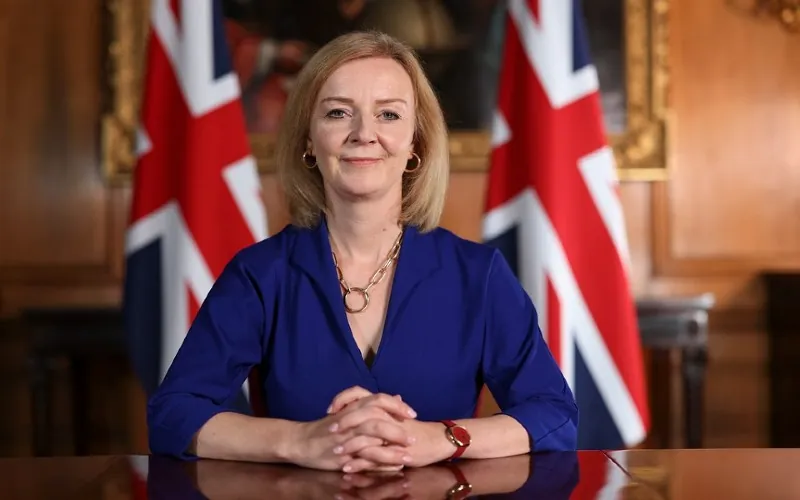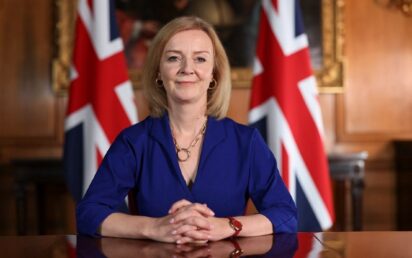Liz Truss has come out on top in a bitterly contested Conservative leadership contest and will be Britain’s next Prime Minister.
The Foreign Secretary won 81,326 votes (57.4%) from Tory members compared with former Chancellor Rishi Sunak’s 60,399 (42.6%).
Current PM Boris Johnson, ousted by his own MPs earlier this summer but backed by Truss while Sunak quit the Cabinet, will tender his resignation to the Queen at Balmoral on Tuesday before Truss arrives to confirm her appointment as the nation’s third female Prime Minister.
An emergency Budget is expected in the coming weeks as Britain stares down the barrel of low growth, a cost of living crisis and potential recession.
Truss’s team is thought to have been working on a plan to freeze energy bills amid the soaring cost of gas and electricity, with urgent action demanded by the Federation of Small Businesses to help SMEs as well as individuals. Companies, unlike households, are not protected by the energy price cap.
Truss has said she would reverse a 1.25% rise in National Insurance – which the Institute for Fiscal Studies (IFS) said would benefit high earners more than those on low income – and suspend an increase in corporation tax.
Northern business leaders have already written to the new Prime Minister to call for continued commitment to levelling up the North’s economy.
The NP11 group of Northern Local Enterprise Partnerships (LEPs) sets out out five key offers from the North to help the new government deliver on its ambitions for the whole country: developing green energy; unleashing private sector innovation, particularly in life sciences; exporting innovation globally; giving passionate Northerners ‘the fundamental tools to create the prosperous economy it can and wants to achieve’; and adding at least £10 billion to the UK economy by helping digital businesses across the North scale up and create highly skilled jobs.
Sir Roger Marsh OBE, chair of the NP11, said: “Too often the North is presented as a problem child, when in fact it holds the solution to addressing many of the challenges – and indeed the opportunities –the UK faces.
“Prime Minister Truss has a full in-tray of issues needing urgent attention, which is why we have written to her to set out practical ways in which the North can help tackle national concerns such as energy cost rises and the imperative to develop secure, green domestic energy supplies in response to the Russia-Ukraine war, while also unlocking new sources of economic growth that will improve opportunity and living standards for people and help build a competitive, Global Britain.
“With the right, targeted investment and by working collaboratively with northern elected and business leaders, we can unlock this huge potential, not just for the benefit of the North but for the whole country.
“Our offers and asks are well-developed and based on solid evidence about what the North really needs to prosper, so we can help the Government bring forward plans at pace that will realise the promise of levelling up set out in its 2019 election manifesto.”
Software coding trainer launches new data engineering bootcamp
Alistair Sergeant, CEO of London-based AI and automation specialist Equantiis, said: “Truss’s first priority must be addressing the need for urgent stabilisation in the UK’s economic strategy and getting confidence and reassurance back into businesses.
“The tech industry also needs specific support incentives that ensure businesses keep on investing during a downturn. We are already witnessing organisations cancelling innovation projects so they can hold onto cash in case the road ahead is bumpy.
“When this happens it only sets us back in terms of our technology advances and global competitiveness, putting further risk to employment within the sector. The UK simply cannot keep putting off much needed technology investments that have already had significant delays.”
Edward Halsey, co-founder and COO of Glasgow-based hubb, an InsurTech focused on the SME market, said the UK tech sector has reason to feel positive about a future under Truss “given her previous focus on boosting the UK’s digital trade globally”.
“FinTech and InsurTech in particular have seen a great increase in demand as a result of coronavirus and with tech contributing more than 2.9m jobs to the economy, Truss will be better positioned that ever to follow through on her previously stated goal of turning the UK into the technology hub for the global economy,” he added.
Russ Shaw CBE, founder of Tech London Advocates and Global Tech Advocates, welcomed the “clarity” after long weeks of campaigning.
“On a lengthy to-do list, one of the most pressing challenges for Truss will be attracting talent to a sector which is growing rapidly but also experiencing record vacancies,” he said.
“Solving this issue will require the new Prime Minister to make it easier for foreign workers to apply their skills in the UK through expanding schemes like the Scaleup Visa, while also investing in home-grown digital education to improve the domestic talent pipeline.
“Nearly two years on, a number of recommendations from the Kalifa Review are yet to be implemented – this is an area where Truss can make immediate progress if she wants to position herself on the side of UK FinTech.”
‘World’s toughest’ security rules to protect UK from cyber attacks

